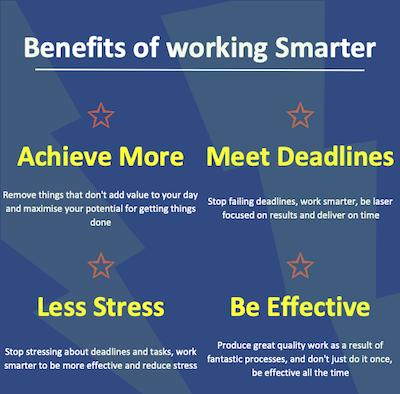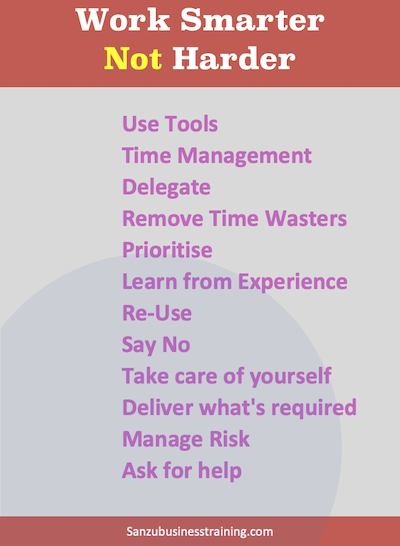
Working smarter means being more effective, using techniques to be more productive when managing and carrying out your tasks.
Many people fall into the trap of believing that being productive means working harder, i.e., longer hours or faster, often exhausting themselves when faced with rising challenges at work.
However, this approach is questionable and fails to address whether you are optimizing how tasks can be carried out.
By focusing on working smarter, not harder, you can:
- Achieve more
- Meet deadlines,
- Reduce stress,
- Be more effective

But how do you approach this? The answer, I believe, is to not re-invent the wheel but to use some well-established methods that are proven to deliver results.
I believe that 12 key ‘work smarter’ methods can deliver the most significant gains.
Let’s take a look at them:

1/ Use tools
Unfortunately, too many of us fail to use the most effective method of undertaking the task.
This often involves using the best tool to do the job.
For example, creating a project plan using PowerPoint is probably not the smartest idea when there are more appropriate tools to help us build project plans.
Choosing the wrong tool can add time to a task and compromise the end result’s quality.
I understand that it’s not always straightforward; for example, there might be multiple technologies or tools which can, more or less, do the same thing.
For many of us, those tools are put in place by the businesses we work for.
Unfortunately, it’s common for organizations to implement tools (such as MRP software) while not fully understanding their capability and what they will achieve and how those tools meet the user’s actual needs.
Using the wrong tool can have mixed results, including:
- Taking longer to achieve the result you’re looking for
- Impacting quality
- Costing more to meet the desired result
- Impacting your customer
2/ Improve time management
Effective time-management skills allow you to achieve your tasks efficiently and effectively.
There are many time management techniques, but personally, I think it boils down to just four or five key ideas, these being:
- Plan your work
- Prioritize
- Don’t overcommit
- Focus on being productive
- Learn from your mistakes
For many of us, especially those who see new important priorities added to their to-do list regularly, we can find time management challenging.
However, it’s important that you don’t lose sight that this is one key aspect under your direct control that can have a huge impact on how productive you are.
3/ Delegate
One of the worst things you can do when trying to be effective is to simply try and do everything yourself.
Where possible, you should review your options of collaborating with others to get priority tasks achieved.
This does not mean merely dropping your problems onto others but appreciating that if you are equipped to ask for help, then do so; typically, this will be in a situation where you:
a. Work as part of a team
b. Have subordinates
c. Have a large number of priority tasks
d. Have been provided some support to execute your workload
One of the challenges with this is learning to let go and playing to your strengths. Most of us tend to think we can do the task better than anyone else, so we hold onto things. We then collate so many tasks we drown.
We can work far more effectively by being selective over tasks, playing to our strengths (core competencies), and using the help of others where it’s available.
4/ Remove time wasters
Another key aspect in working smarter is to focus on the job at hand and not get derailed by other activities.
Interruptions can come in all guises from chatting with colleagues, checking emails, IMs, phones, etc. There can be a myriad of interruptions waiting to stop us from focusing on the things we should.
So what do we do about them?
1/ Organize your workspace to avoid distractions
2/ Set do not disturb on messaging apps
3/ Place our phone in our bag or desk draw
4/ Have a to-do list and stick to it! Don’t be dissuaded by other “more interesting” tasks than the one you should be working on
5/ Prioritise
By setting priorities, you are driving yourself to work on tasks in order of importance.
That importance might be derived from deadlines, complexity, how the deliverable integrates with other tasks within your team.
Without priorities, you’re more likely to choose the work you do by a “scattergun” approach and not which is most important.
Manage your priorities using an app or appropriate tool or at the very least a simple list on a piece of paper
Regularly review your list, updating priorities as they change.
6/ Learn from Experience (LFE)
In order to be truly effective, we need to incorporate learning into our routine; this might include
- Learning when things have gone wrong, and we need to learn how to adapt our process
- Learning when things have gone right, and we need to repeat the best practice.
I suggest that you set some time aside each week to review what you need to incorporate; I’d suggest that you capture this on a list or spreadsheet so that you don’t lose sight of it.
Learning from experience is key to continuous improvement. Get this right, and you are likely to see incremental gains over time.
7/ Re-use
In our working life, we are likely to undertake a variety of tasks and produce a range of outputs.
In many cases, elements of these can be reused for other similar tasks.
For example, there’s no point in creating a sales PowerPoint from scratch if you have one that you’ve previously given that can just be revised.
One of the challenges here is that you’ll need access to work done previously; this implies some form of record-keeping or filing system where you can retrieve work that might fit the bill.
I’d always recommend that when you’ve been given a task, you ask yourself, have I done something similar before that I can reuse as a base for this piece of work.
8/ Learn to say no
Now this one’s a difficult one. Part of being effective is focusing on what can be achievable; some of us find it hard to say no (especially to our boss) and take on more and more work promising deliveries that we can’t make.
Learning to say no might include:
· Saying no to the task and asking for someone else to pick it up
· Saying no to the delivery date and promising against something more realistic.
Of course, this isn’t always easy; saying no to people in power at work can be challenging, and we often don’t because we feel it might threaten our career if we turn things down.
However, in my experience, most leaders would rather have a realistic understanding of when work will be done than seeing something fail and get left empty-handed.
9/ Take care of yourself
One thing that people often miss out on when working is taking care of themselves.
However, this needs to be central to working smart.
Working yourself into the ground, being stressed, not taking breaks, eating poorly, and not getting enough sleep contribute to effectiveness.
The other key concern is that you might not realize when you’re burning yourself out.
If you fail to recognize this yourself, it might come to someone telling you that you need a break.
Whatever the situation, you’ll find yourself more effective when physically and mentally prepared to do the work.
10/ Delivering what’s required
Another key to working smarter is to remain focused on delivering what your customer requires.
Your boss wants a sales report for this month; you’re short of time? Don’t then look to over embellish with 2 Years Worth of data with analysis and trend calculations that have not been requested. You’re eating into valuable time that you could be using on other tasks on your priority list.
Focus on what’s being asked for and make it the right quality.
11/ Manage risks
When risks become issues, they impact our ability to work effectively.
The good thing is we can work smart and manage risks with mitigation which helps us prevent them from turning into issues.
What’s key is that you:
- Think ahead and consider what risks might occur; these are often based on dependencies.
- Document your risks, so you don’t forget about them
- Prioritize
- Mitigate – plan steps that help you evade risks and prevent them from turning into issues.
12/ Don’t be afraid to ask for help
Finally, working smarter does not mean doing everything yourself.
People that are effective at getting things done tend to be excellent at reaching out to their network for help.
This doesn’t have to be delegating but could involve mentoring, seeking advice, or when problems occur, going back to your customer and asking for a change in deadline to help you achieve their task.
Don’t suffer in silence – speak up and ask for help.
Summary
We all suffer at some stage with overwork, stressful deadlines, or issues that prevent us from being effective.
Sometimes it pays for us to take a step back and look at our working process to ensure we’re getting the most from it and changing it if we’re not.
Not all of the methods we’ve listed above are easy. Saying no, for example, is a huge challenge for some.
The truth is if we analyze how we do things, most of us will see areas that we can work smarter.
How is your productivity? Have you got any tips or hacks that would benefit our readers?
As ever, we’d love to hear from you; you can reach us on Twitter (@sanbustrain) or via the comments section below.
This article is part of our Career Skills Guide